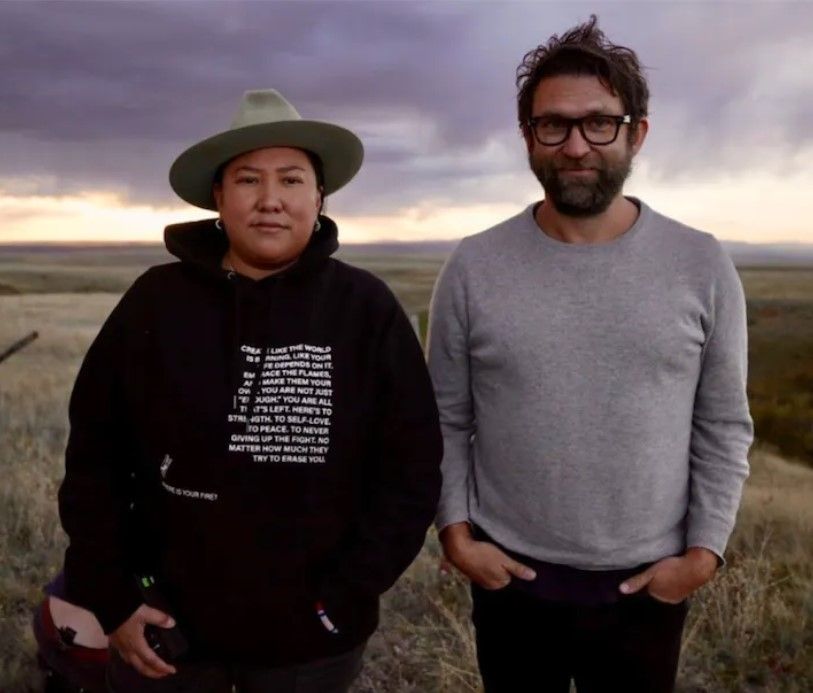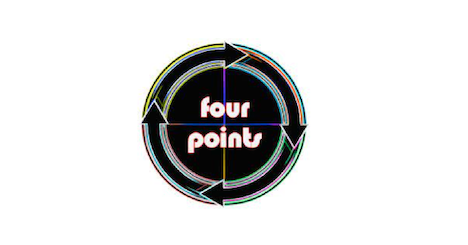A conversation about “Murder In Big Horn”
Co-Directors Galkin and Benally sit down with Rusty LaFrance

In this interview with Four Points Press, Showtime docuseries “Murder In Bighorn” co-directors Matthew Galkin and Razelle Benally share their thoughts on making the series via Zoom. From the start of the first disappearance to the release of the film, Four Points discusses Benally and Galkin documentation of the heartbreaking MMIW cases that caught the nation’s attention.
Four Points Press: What about this area made you want to cover the Missing and Murdered Crisis here?
Mattew Galkin: There's a number of reasons why we chose Big Horn County, and specifically the Crow Reservation. We (Galkin and Benally) knew from the beginning that we didn't want to make a documentary series about MMIW, it was very important to us to tell a story about humans who were going through something. Because we wanted this story to reach the widest possible audience, and we knew that one of the ways to gauge people's emotions is to tell a human story.
Unfortunately, there is a high concentration of MMIW cases, it was a place we could focus on and tell numerous stories at once. One of the main reasons was the families at the center of the cases, that is Henny’s family, Kaysera’s family, Selena’s family, and before that Hanna Harris’s family, they were absolutely instrumental in putting the MMIW crisis on a national stage.
We were able to tell the human story of these cases, but also through the telling of this story, we could show how this movement of bringing awareness to the MMIW Crisis and how it grew from grassroots, and now has been given space on a national stage thanks to the advocacy of these families about this crisis. People outside of the community now know about MMIW.
Razelle Benally: There was a lot of movement in a small area, and if you were to approach making a series about something as large and complex as MMIW, you have to start small and work your way out to the larger broad view of what MMIW is.
If you tackle it from a large scale, it is going to miss the audience. When you start from a pure story point of view, people will feel something, and when they feel something, they want to do something. When you throw the statistics at people, it’s not the best approach. That is why we wanted to start in this area.
Four Points: How have these cases affected you personally?
Benally: For me, although I am not Crow or Northern Cheyenne, I am an Oglala Lakota and Diné. And so traditionally, our people traversed the same regions and areas, and so I feel a connection to that area of the and being that Little Big Horn (Battlefield) is right there and that's where our last big war was fought.
And so, with these particular cases, it hit a note somewhere deep inside of me, because I myself have relatives and family members who have gone missing, who are missing right now, and who have been possibly murdered. And so when you are listening to these families, speaking with them about their loved ones, that affects you, and it hits you in your heart.
For me, it's like we are all grieving together in one way or another, because it's happened in my own life and my own family. I may not understand completely what they’re going through, but I can also relate as a Native woman who also has missing family members.
That weight that is there that is with these cases, I’m carrying that with me; It’s not on purpose, that’s just how it is. So you want to do right for these families and do right by the victims, so that does affect and change how you navigate these stories and the sensitivities surrounding it all.
Galkin: I was affected profoundly, honestly from day one. For me, I am non-native, and so it instantly became a human story. With the series, at least for me, it was a way of helping these families.
One of the things that struck me so profoundly was just how pervasive this issue is, the fact that literally everyone we talked to was touched by this in some way. I did not expect that. I thought at the very beginning of this process that I knew it was an issue.
I thought that we were just focused on a handful of very specific cases, but outside of these families, literally everyone we had spoken to had experiences. Brothers, fathers, mothers, daughters, sisters; it just seems endless and heartbreaking.
Not that we needed an incentive to begin with, but it was more to push this series out. Razelle and I obviously brought very different perspectives together for this collaboration, but there was a lot of overlap in a lot of ways.
I come at this (issue) with a “non-native” view, and for non-natives to connect with this series, it needed to be a human story. These are parents that lost their children, families that have lost a member, that is at its base level, what draws people in. Not numbers and statistics.
Four Points: With the success of “Murder In Big Horn,” how do you hope that this project will help bring more awareness to MMIW or to slow or stop the MMIW crisis?
Benally: I would hope that it makes people uncomfortable to watch this. Outside of our own communities, I want people to feel uncomfortable with what’s happening. Because when you are uncomfortable, it activates people to want to do something. If anything, I hope that what our series does is encourage families to speak up.
I know traditionally, in different tribes, we’re not supposed to talk about the ones who’ve passed on. We don’t say their names. And now a lot of common taglines for MMIW is “say their name” so people don't forget, but what some people don't know is that in a lot of tribes, they might not even be able to say their loved ones names.
We shouldn't be talking about them traditionally, but then it's up to our generation. If we can't say their name, if we can't talk about this, then how are things going to change?
It's an important dialogue to have internally amongst tribal members, holy people, knowledge keepers to talk about, if saying their name goes against our traditional teachings, but people keep dying, what are we supposed to do?
What I hope our series does, is that whatever tribal teachings you have, that we figure out something to do about this, and if it requires relatives and family members to stand up and be vocal, and push. We just wanted to give them a moment of “here is space where you don't have to fight to be heard. We are listening.”
I would hope that there is a world in the near future, where we start to believe in law enforcement, because now the ball is in their court. Are they going to continue to ignore this when a national spotlight has been placed on their agencies? On their negligence? On the areas of biases that prevent proper protection of our people?
Four Points: Are there any plans to expand “Murder In Big Horn”?
Benally: There were a lot more cases slated for our series, but with how filmmaking works, it's really difficult to try and elicit compassion and feelings for a particular story, then leave it and move on to the next one.
Part of the reason MIBH has been received so well is because we lived with them for the entire time; we just didn't have enough time to do that with more cases.
If we were to have tackled 20 cases in the same amount of time, I don't know if the series would have been received well or would have hit as hard. Because then we are only doing five minutes for each case, and it becomes a roll call for cases, where the effectiveness for feeling for the families, becomes less.
Because we were able to focus and be with them for a longer period of time, you felt. It is really unfortunate that we couldn't tell more stories, but just because we couldn't tell all the stories, doesn't mean that it is any less. Every case means just as much as a case we have focused on in the series. We can't keep losing human beings in this way. We can’t.
Four Points: What are your hopes for the audience to gain from watching this series?
Galkin: Raising visibility is of course of huge importance to us, especially if the end result is passing legislation, but hopefully at the very least, that local law enforcement be able to communicate in a much more efficient way when it comes to people going missing.
There just doesn't seem to be a real protocol in place to deal with any of these cases. The historical aspects of our series were quite eye-opening to me.
It is not a history I was taught growing up as a non-native, and I think it's crucial as non-Native American citizens that we need to be confronted with the actual history of our country. Hopefully, this is one tiny step towards continuing education for non-Natives on American history.
____
Four Points Press recently held a public showing and Q&A of Murder In Bighorn at the Little Big Horn College Cultural Center on Feb. 13, however due to recent bad weather, the public showing of episode 3 will be rescheduled for a later time.
